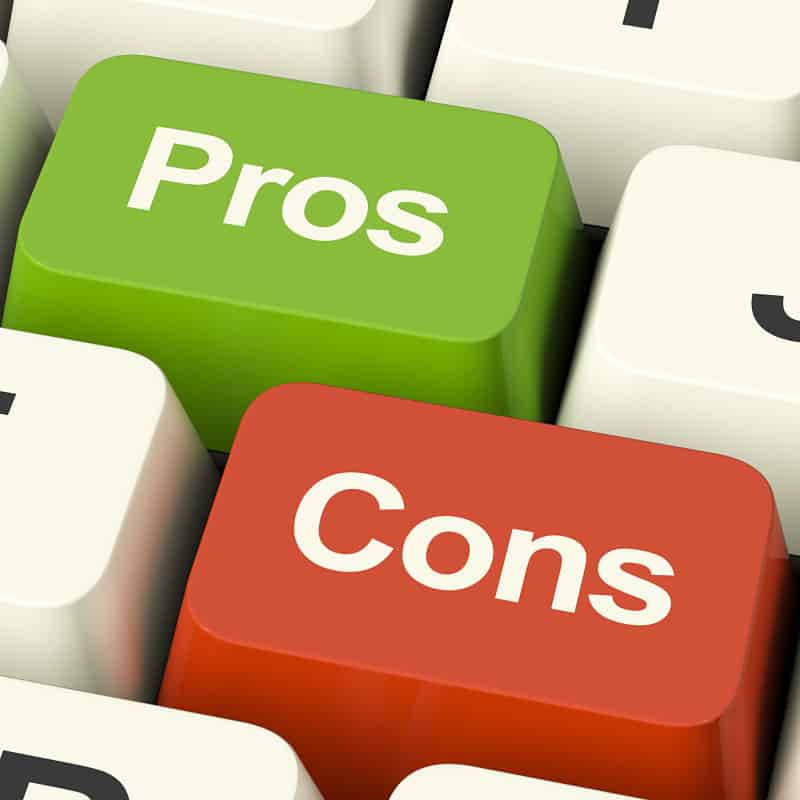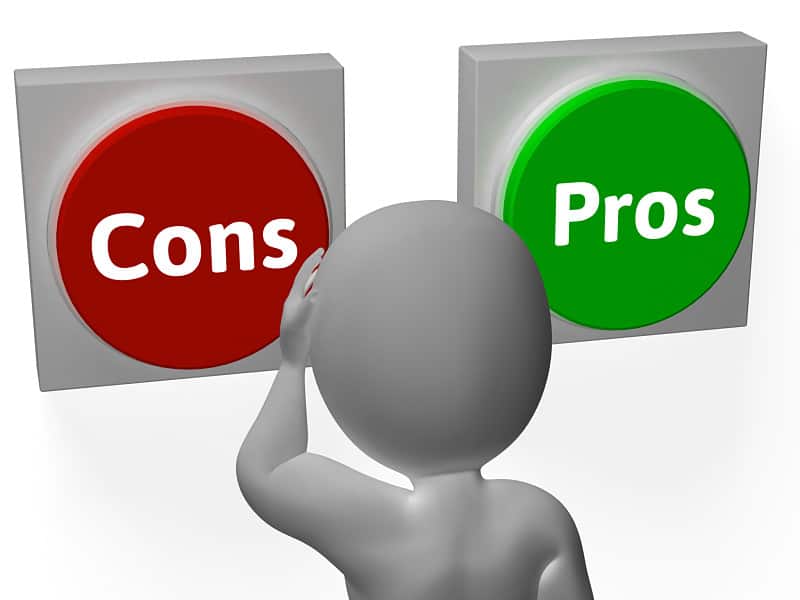
Pros and cons are part of life. Anything—from the most abstract concept to the tiniest little action—has its upsides, downsides, advantages, and disadvantages.
Over time, words have evolved to take on two forms, known as the positive and negative connotations of words. The dictionary is what makes this possible.
The words “pros” and “cons” are commonly used to describe the positive and negative features or aspects.
“The pros of living in Japan include the beautiful scenery, great food, and friendly people,” while the cons are the negative (e.g., “the cons of living in Tokyo are the high prices, loud traffic, and endless rain”).
But there is more to them. It is common to over-emphasize the positive aspects of something or someone while under-emphasizing the negative side. This leads us to believe that a product has no flaws or fewer than it does.
Many people assume that positive and negative things are opposites. If you consider something like electricity, it makes sense that the positive represents one half of the source, while the negative is the other half.
You may also consider ethics to be a sort of dichotomy: black or white; right or wrong; good or bad, but this too isn’t always the case.
When it comes to pros and cons, there is no “better” or “worse” side here—only different advantages and disadvantages to consider and weigh.
“Pros” and “Cons” Meaning
Many people use the words “pros” and “cons” interchangeably. And while they are closely associated with one another, they have different meanings.
- A pro is something that helps your cause, or in other words, it is beneficial to you.
- As the case may be, a con works against you in some way.
- The word “pros” means the positive side of a topic.
- The word “cons” means the negative side of a topic.
If you’re reading this phrase for the first time, you can read more about it here. The word was derived from the Latin expression “pro et contra,” as “pro” means for or on the side, and “con” means against.
Usage Example: “I wanted to buy an electric car, but after weighing up the pros and cons, I decided to stick with petrol.”
By considering the advantages and disadvantages of a particular thing, we can predict its impact on the future. So, its usage is more practical than theoretical.
This phrase presents both sides of an argument or discussion in one short phrase.
What are “advantages” and “disadvantages”?
The advantages and disadvantages of something are its positive and negative aspects of the good and bad things.
For example:
“Advantages and disadvantages of living in a big city.”
“Many people consider the advantages of a university education to be outweighed by the disadvantages.”
What is the meaning of “good” or “bad”?
If someone asks you whether something is good or bad, that is an open question because we all have our own opinions and can consider something good for us and bad for others.
For example:
The word “good” has many meanings depending on what you’re talking about. If you’re talking about a person, it can mean they are kind or helpful. If you’re talking about a food item, it can mean it tastes delicious or hasn’t gone bad.
The word “bad” is the opposite of “good” and describes something that is not right. For example, if a friend hurts your feelings, their behavior would be considered bad because they did something not nice. You would describe a food item as “bad” if it were spoiled or rotten.
However, one thing that, I think, would apply in most cases is understanding who decides whether something is good or bad.

For example:
If you’re making your own decisions about what’s good or bad, then nothing you do can be terrible because you’ve chosen to do it.
If you’re being directed by someone else, then the only way something can be bad is if it doesn’t meet their expectations (which may or may not be reasonable).
“Good” or “bad” synonyms
“Good” has two meanings, depending on the context. The first is “perfect” or “on-point”, usually said after a performance. The second is “very well” or “thoroughly.”
1. agreeable, pleasant, nice,
2. capable and knowledgeable,
3. satisfactory, adequate, fair,
4. content, fortunate, and prosperous,
5. virtuous, righteous, and deserving.
The most important thing to remember when trying to understand how to use “good” and “well” is that “good” is an adjective, and “well” is an adverb.
“Good” Example:
The students did a good job on their tests.
The synonym for the word “bad” is “terrible”.
1. No way or degree is good.
2. possess undesirable or negative characteristics,
3. distinguished by poverty,
4. distressing; unlucky; sad; painful; a bad accident,
5. afflicted with a digestive system disorder: upset stomach,
6. ill; sick; in poor health,
7. having a bad character; morally repugnant: bad habits,
8. of poor quality; substandard: a bad diamond; a bad spark plug.
9. inaccurate, inappropriate, or wrong: A bad guess is better than none, isn’t it?
10. invalid, unsound, or false; a bad insurance claim; bad judgment.
When it is not a good thing, it can be:
- poor,
- bad,
- inferior,
- lacking in quality,
- Second-rate,
- substandard,
- unacceptable.
Is there a difference between “good” and “bad”?
I’ve heard people say “good” and “bad” with the same tone of voice, but it doesn’t mean the same thing. The words are associated with two entirely different meanings.
- If someone says, “I want to do good,” that means they wish to go out and help others. But if someone says, “I want to do bad,” that probably means they intend to go out and break the law.
- If someone says, “That was a good thing you did,” that generally implies that it was a positive thing you did. However, if someone says, “That was a bad thing you did,” it usually means it was negative.
So, why is this? Is there really a difference between “good” and “bad” meanings? I think so. The difference has to do with how we associate those words with our lives.
Slang words can take on different meanings depending on the situation and the people using them. Slang words like “lit” and “bad” are examples of slang. They change their meaning based on who is listening and how they are used.
You shouldn’t assume you know what someone means when they say something like “bad” or “nice,” because they could be using them in a wholly different way than you expect.
There are two types of words:
- Dictionary words, i.e., words that have a meaning in a dictionary or lexicon of the target language, and
- Non-dictionary words, i.e., words that do not have a meaning in a dictionary or lexicon of the target language.
(Note that the distinction is between “words” and “meanings”, not “words” and “uses”).
What are examples of “pros and cons”?
The expression “pros and cons” is a short-handed way of saying “the positive and negative aspects [of something].”
In other words, pros (short for “prosperities”) refer to the positive aspects of what you’re talking about, while cons (short for “considerations”) refer to the negative aspects.
Examples:
- There are definitely pros and cons to owning a dog. (On the one hand, you’ll never be lonely because your dog will always be there to keep you company. But on the other hand, you’ll have to clean up after it and feed it every day.)
- Let me lay out the pros and cons of the proposal.
- What do you think? What are the pros and cons of this idea?
- The pros and cons of moving to another country are something to consider carefully before taking such a big step.
- “The benefits of a college education are many. There are career opportunities, personal growth, and financial stability. But with those pros come some cons, such as student loans, lost wages while attending school full time, and less time for family.”
Other samples:
- The pros and cons of buying a house during the holidays,
- The pros and cons of having a pet,
- The pros and cons of moving to a new city,
- The pros and cons of having children,
- The pros and cons of having a roommate,
- The pros and cons of dating an older man,
- The pros and cons of keeping in touch with your ex,
- The pros and cons of getting married young,
- The pros and cons of buying a house in the suburbs,
- The pros and cons of working from home,
- The pros and cons of free trade agreements,
- Pros and Cons of Exercise.
Conclusion
Pro and con are two sides of the same coin.
Learn to identify the pros and cons of a situation or a proposal, and you will have taken the first step towards a balanced, logical view.
Look up pros and cons in any dictionary, and the result will be essentially the same. To summarize, we can say that a pro is a positive feature of something, and a con is a negative. They are essential “pro” arguments for and “con” arguments against something or some situation.
The study of pros and cons will help you develop a profound understanding of the issue, whether it’s about your career, society, or the world around you.